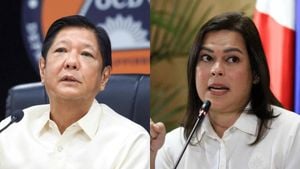President Prabowo Subianto announced on November 29, 2024, a significant increase of 6.5% to Indonesia's average minimum wage for 2025. This announcement was made during a meeting at the Presidential Palace, where Prabowo convened with key ministers and labor representatives to discuss the wage adjustments, emphasizing the importance of worker welfare and economic stability.
The increase was originally proposed at 6% by the Minister of Manpower, but upon discussions with labor leaders, the government decided to boost it slightly higher. Prabowo stated, "The minimum wage is intended to improve workers’ purchasing power, considering the need for businesses to remain competitive. It acts as a social safety net for employees, particularly those who have not been employed for long periods." This sentiment highlights the administration's goal to balance worker support with business viability.
During the meeting, labor leaders expressed this increase as being closer to their aspirations, particularly after many had advocated for raises ranging from 8% to 10%. Labor Party president Said Iqbal remarked on the discussions, confirming the approval of the raise as it aligns more closely with worker needs.
Prabowo explained how different provincial councils, as well as city and regency wage councils, would determine the sectoral minimum wage component, ensuring flexibility to meet different economic conditions across Indonesia. This sectoral approach aims to adapt wages according to local economic circumstances, allowing for more equitable compensation aligned with regional disparities.
Further detailing the government's initiatives, Prabowo announced the budget for the Free Nutrition Food Program, which will provide assistance of 10,000 rupiah (approximately 0.60 USD) per child and pregnant woman daily. This program is poised to aid over 15 million individuals starting January 2, 2025, with the objective of improving nutritional standards among families, particularly those affected by economic decline.
Despite these steps, there remains tension between the administration's efforts and the demands of labor groups. Many unions are bracing for potential unrest, with calls for strikes and protests looming as workers push for more substantial increases. Iqbal stated, "We will continue to fight for sectoral minimum wages exceeding the standard." This indicates potential unrest on the horizon as labor groups prepare to voice their discontent over what they view as inadequate compensation relative to rising living costs and inflation.
Adding to the complexity, the government's plan to increase the value-added tax (VAT) to 12% starting January has faced backlash from workers. Labor groups fear rising taxes amid struggling wages could lead to reduced spending power. Iqbal emphasized, "Workers will not accept this increase until wage adjustments reflect our situation and provide proper relief. It will only exacerbate financial strain across families." This position could lead to more organized resistance against the government's economic strategies.
Analysts note the overall economic conditions also impact these wage determinations. Indonesia’s economy is grappling with shortfalls in consumer demand tethered to high borrowing costs and recent factory closures. Prabowo highlighted the importance of boosting economic activity and purchasing power without exceeding the modest budget deficit which is part of his economic reform agenda. The administration aims for sustainable growth, balancing social welfare with fiscal responsibility.
Although the new wage increase appears to be a positive step for labor, many workers will continue to advocate fiercely for their rights and needs, making 2025 a pivotal year for labor relations and economic policies across the archipelago.



